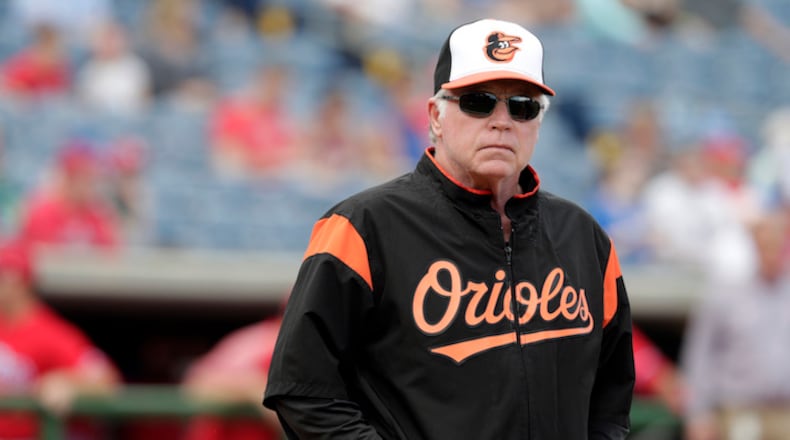Running a major league team for the first time in four seasons, 60-year-old Ron Gardenhire thought about all the data and video rammed into the microchip of his iPad, a slew of statistics his bosses hope transform defeats into triumphs.
Baseball wasn't like this four decades ago, when Gardy left college to begin his career as an infield prospect in the low Carolina League, down in Lynchburg, Virginia.
"If you're not changing, you're probably not going to last," the new Detroit Tigers manager said. "There's so much information out there. You have to use it."
"I'm always going to be an old-school guy. I believe in prep and workouts and all that stuff and taking groundballs," he added. "But the game has changed, and we've got a lot of information that's going to help us."
Gone are the days of John McGraw, Leo Durocher, Gene Mauch and Billy Martin, martinets who ran their fiefdoms largely by guts.
"Many of the managers were probably like the general type of personality," Boston Red Sox president of baseball operations Dave Dombrowski said. "They were just very strict: It's my way. This is the way it is. Not all, but a lot of them. I don't think that this goes over with this generation the same way. Not only in baseball, but just with the overall population."
Today's manager is salesman as much as strategist, digesting behind-the-scenes dissections of dozens and persuading players to accept facts over faith. He must have a sweet smile as the franchise's face, sitting in front of a backdrop with sponsor logos before and after 162 games a year — and hopefully more.
"The manager in today's world is an extension of the front office's philosophies and the front office's efforts and someone that you can collaborate and work with," Yankees general manager Brian Cashman said.
Gardenhire led Minnesota to six division titles from 2002-14 and was the lone veteran big league manager hired during the offseason.
Boston's Alex Cora, the New York Mets' Mickey Callaway, the New York Yankees' Aaron Boone, Philadelphia's Gabe Kapler and Washington's Dave Martinez are all rookie skippers. Boone never held an on-field job since retiring as a player.
Fresh and friendly are in.
"The decisions still need to be made — when are you going to hit/run, when are you going to take out the pitcher, when are you going to bunt," Houston GM Jeff Luhnow said.
"The amount of information available to managers is a multiple larger than it was five years ago, but it doesn't mean that managers necessarily do anything differently. They still have to look at what's going on on the field, assess it, use their best judgment and make decisions," he said.
Managers are certainly free to choose their moves. But if they don't work out — or maybe even if they do — they're definitely going to hear about it from fans and the media.
GMs, too, usually debrief managers to learn reasoning.
"If you talk to Tony La Russa after a game, he'll tell you, 'Well I considered these four alternatives and I thought option B was the best option,'" Dombrowski said.
A decade or two ago, a manager would hear advice from coaches, a GM, an assistant GM and maybe a farm director. These days, the array of front-office titles is expanding like the universe.
The World Series champion Astros have a special assistant to the GM for process improvement who was once a NASA biomathematician, and a senior director in baseball operations for research and innovation.
Boston's staff includes a vice president of baseball research and development who oversees a director of baseball systems, a senior analyst of baseball R&D, three baseball R&D analysts, two senior developers, an assistant director and a data architect. The NL champion Los Angeles Dodgers have five senior analysts and four analysts, plus engineers and technicians.
The Mets receive data from about five different firms.
Sure different from the days when Buck Showalter was a minor league manager in the 1980s and had his wife, Angela, keep color-coded spray charts on hitters.
Much of today's info is helpful. But managers must defend against digital overload cluttering craniums trying to catch up with 100 mph fastballs or trying to power them past batters.
"A lot of the data is not really going to be functional to a player — wins above replacement, all the things that we're talking about that are kind of in the macro," said Mike Scioscia, the senior big league skipper as he starts his 19th season with the Los Angeles Angels.
Scioscia prefers players be given more tangible info: "Where do I hit the ball the hardest? What pitch should I look for?"
Longtime manager Jim Leyland said today's managers still use their instincts. Numbers don't quantify people.
"There is more information now. Some of it's pretty valuable, some of it's irrelevant," he said. "When you're living with that player day in and day out, you know who can handle being up there."
About the Author


